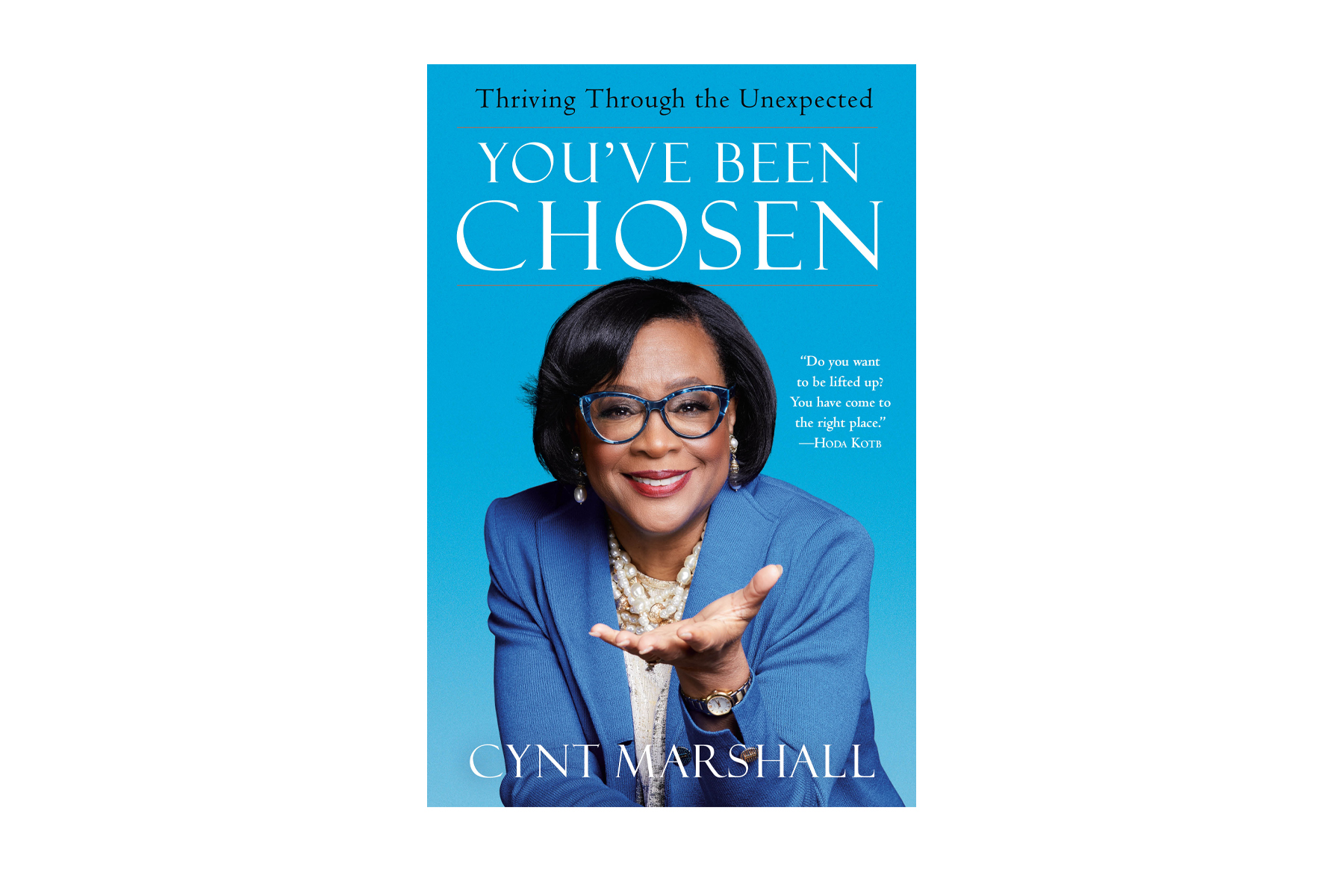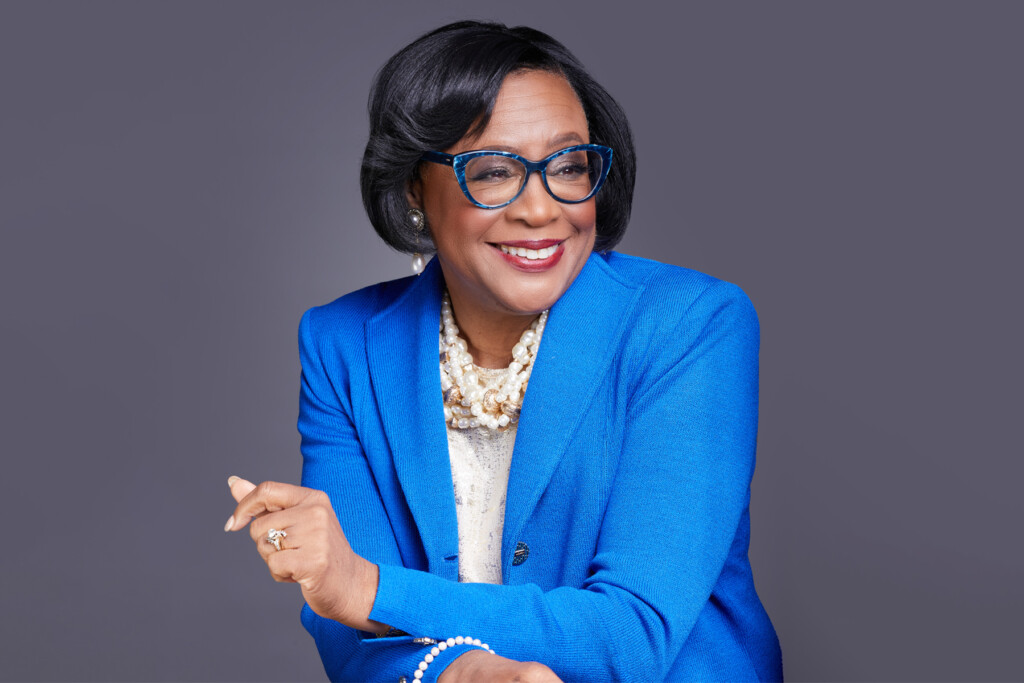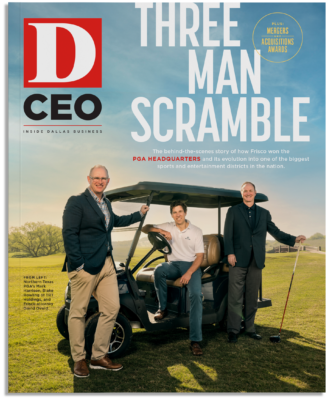Twelve years ago, as she endured a fierce battle with colon cancer, former AT&T exec and current Dallas Mavericks CEO Cynt Marshall found solace by journaling. Through 12 rounds of chemo, she documented her feelings and experiences. Later, after beating the odds, others asked to read the journals as they went through battles of their own. That led Marshall to think about turning them into a book.
She connected with Dallas literary agent Jan Miller, who loved the story but told Marshall she had important lessons to share about leadership and motherhood, too. “I thought the original was a masterpiece, and didn’t want the cancer story to get lost,” Marshall says. But in the end, she hunkered down and wrote. Ballantine Books, a division of Penguin Random House, published her memoir, You’ve Been Chosen, last fall.
The experience of sharing her story changed her as a leader, Marshall says, driving home the importance of authenticity as a core value. The evolution comes at a time when people are demanding authenticity and empathy in the wake of the pandemic.
“Everyone has gone through a lot, and people have learned how to integrate their lives to prioritize their physical and mental and spiritual health,” Marshall says. “And it’s not just leaders, but all of us. We’ve all been chosen for different roles. It’s all about being there for others.”
Here are three lessons for business leaders, excerpted from Marshall’s new book.

1. Pay Attention.
In the spring of 2010, not too long after my 50th birthday, I sat in a Dallas conference room with my colleagues, AT&T leaders from across the country, filling out the human performance expert Jack Groppel’s The Corporate Athlete assessment questionnaire. As the president of AT&T North Carolina, I was required to be there. But I didn’t expect much from the session.
I was sure I wouldn’t find out anything new about myself. I knew me! I was in excellent emotional, mental, and spiritual health. I read and kept my mind sharp. I spent time with my family and friends to get the emotional support I needed. I was intentional about making time for prayer, going to church, and feeding my soul. As I remember it, my results were off the chart in those categories.
My physical health, though? I thought it would be my lowest score but figured it would still be decent. I used to be an athlete, and now as an executive and a mom, I was constantly on the go. I had already cut back on Ding Dongs and fried chicken. What else would they want from me? I was partially right. Physical health was my lowest-scoring area on Jack’s assessment, but the score was far from decent. It was clear where I needed to put my attention.
A few months earlier, my primary care physician had given me a referral slip for a colonoscopy test, which he called a routine precaution for all his patients when they turned 50. I thought about that slip at the end of Jack’s program, when we were all told to choose accountability buddies within the group and then share one specific action step that we would take for improvement. I turned to Frank, a straight-talking executive from New Jersey, and told him I would get a colonoscopy. I was a busy woman, I reasoned, so I picked something I thought wouldn’t require extra energy.
Over the following weeks and then months, Frank somehow always managed to call me when I was in the Starbucks drive-thru. “Did you get that thing done yet?” he’d ask in his gravelly New York accent. I’d tell him no and change the subject.
Seven months and many Frank phone calls later, I finally got to say yes; the appointment was made, and so could we please talk about something else now? I scheduled my colonoscopy for Dec. 14, the day before my 51st birthday. I was cutting that “get it done at 50” close.
I will remember the anesthesia-induced sleep that day as the best I’ve ever had. I didn’t feel a thing. When I woke up, though, the first thing I saw was my husband Kenny standing over me. Through my anesthesia haze I saw that he was frowning, biting his lip the way he does when he’s bothered. I knew right away something wasn’t right.
“Wife, we’ve got a problem,” he told me, and then he stopped, not sure how to continue. “The doctor saw something he didn’t like.”
I didn’t know how to respond, and my brain still wasn’t working at its normal speed. I reached out toward the paper I could see in his hand. “What’s that?” After a second of hesitation, he said, “Maybe you should read this later when you feel better.” But, Kenny relented, and handed over the report from the gastroenterologist, who had gone off to see another patient while I was still in recovery. He’d given Kenny copies of the scans they took, promising to call the next day to talk me through them. I’m no doctor, but when I looked at the pictures of my body, even I could see the nasty-looking mass.
The day after my colonoscopy, my actual 51st birthday, I went back to the office. I have a tradition that I always work on my birthday, and not just because I don’t want to miss my cake and ice cream at the lunchtime “surprise” party. Growing up poor taught me to not take my career for granted, and whenever I count my blessings, two near the top of the list are a great job and the ability to take care of my family.
Instead of enjoying ice cream with my team, though, I found myself stuck in a conference room, being grilled by auditors making a surprise visit. I had been the president of AT&T North Carolina for almost four years at that point, and we had become a model program that other AT&T programs across the country followed. But that birthday meeting with the outside interrogators was unusually intense, and the way they asked me about some of our business practices sounded more like an inquisition than a normal audit.
As a Black woman in Corporate America, I had learned long ago that I would sometimes be treated as if I were unqualified or untrustworthy. It was an unfortunate reality. I sat with no notes in front of me, grateful for my good memory as I honestly answered all their questions and gave them facts.
I had nothing to hide and kept my cool, but after about five hours and one missed birthday party, my aggravation was starting to show. When my assistant stuck her head into the room to tell me that my doctor was on the phone, I gratefully took the opportunity to step out.
That out-of-body feeling struck as I stood in my office on my 51st birthday and heard for the first time that the nasty thing in the scan was a tumor in my colon and that I needed to talk to a surgeon right away. At the end of the call, he again said that it didn’t look good.
I went back to the inquisition much calmer than I had been before. The auditors’ questions were still ridiculous, but suddenly insignificant compared with what else I was facing.
2. Serve Others.
When I weighed my career options after college, I had two priorities: I wanted to make as much money as possible, and I wanted to be a boss. Money was what would help get us out of the projects but being a boss would give me the chance to impact others.
Pacific Telephone and Telegraph made me the best offer; as I remember, they beat out the competition by just $600 a year. I said I wanted to lead, and just a couple of weeks out of college, I was made a shift supervisor in charge of a roomful of operators and part of a management fast-track program that offered mentoring and a commitment to advancement.
That’s not to say the road was always smooth for a Black girl making her way in 1981 Corporate America.
My very first week of work, my boss’s boss pulled me aside and told me I couldn’t wear my shoes—my only pair of dress shoes, mind you, because I was still waiting for my first paycheck—to work anymore, because red wasn’t an “appropriate” color for the workplace. “And your braids have to come out tonight,” she told me, looking at my hair with distaste. She said it made her uncomfortable to be in a meeting with someone who looked the way I did. I was too “ethnic.”
Yes, that was her word, but I didn’t take offense. In fact, in that moment I was grateful, thinking that this woman was looking out for me and helping me advance. I went back to the office the next day with straight hair, wearing some black shoes and a blue suit my sister lent me. That conservative, all-business style became my workplace look for the next 19 years.
In my 40-plus years of work, I’ve learned that to be a good leader, I need to spend at least half of my working hours investing in the people around me: listening, learning, and loving them. It doesn’t matter whether they’re telephone operators or NBA superstars. I know that I was put on this earth to serve others.
If that means I take paperwork home and do it after my own kids are in bed, so be it. If it means I have worked seven days a week for most of my career, that’s all right. And if serving the people on my team means learning how to climb telephone poles, then that’s what I’ll do.
Back in the early 1990s, I was a district manager overseeing several departments, including the on-the-ground telephone pole repair crews. I was told that I was the second woman to have my job, and the first Black person to have my job, so it was triply important that I knew what I was talking about when I represented the people who reported to me. I wanted to understand what my team experienced. What did they go through?
When one of the union representatives mentioned that the crews all had to go to “pole-climbing school,” I told him to sign me up. He laughed at me. “District managers don’t go to pole-climbing school.”
“Well, I do,” I said. How could I lead someone if I wasn’t willing to step into their job? How else was I going to know what this team needed?
So, I went to pole-climbing school. Somewhere in a closet I still have the boots and belt I wore on my last day of training when I had to climb more than 30 feet up a pole and hang a drop. The union reps and the techs were incredulous that a “suit” would be getting her hands dirty. They came and cheered for me, and it smoothed our relationship for years to come.
The more I served, the more my teams produced. I’d worked on merger teams and helped transition half a dozen new companies into the business, navigated multiple company name changes linked to the acquisitions, and most important, supported the overall business shift from “the phone company” to a technology and entertainment company. The more my teams produced, the more promotions I got—from supervisor to manager, manager to director, director to vice president, vice president to senior vice president, and finally, three years before my diagnosis, to the position of president of AT&T North Carolina.
3. Do You.
Nineteen years after my first boss told me to take out my braids before I came back to work, I had moved up the ranks to become one of the youngest vice presidents at Pacific Bell, which had merged with Southwestern Bell. I’d climbed further and faster than I’d ever dreamed.
Then, one night, my boss called me at home. “I have some good news,” she said. “The board just met, and they selected you to be an officer of the corporation.”
I was shocked. I knew I was doing well, but an officer? That was the highest level a person could go, and I was barely 40. It would make me a top shareholder—an owner, in other words—of Southwestern Bell, not just an employee. There were only 110 officers in a company of 200,000 employees, and at the time, only two of them were Black women. This was a very big deal for a girl from Easter Hill. I could tell Kenny was listening to my end of the conversation. When I said, “Becoming an officer is quite an honor,” his eyes got big. He’d worked for Pacific Bell for a time, and so had his dad. He knew what being an officer there meant.
Then my boss shifted gears. “Of course, you’ll need to cut your hair,” she said. No, I hadn’t gone back to braids or grown out an Afro. I had a totally respectable corporate style, but this woman had the nerve to tell me that she thought I would look better, and “more like an officer,” in a shorter cut. Then she gave me the name of a clothing brand that I should buy. She told me to wear more white, because it would complement my skin color. “I left a magazine on your desk,” she said. “There are Black people in it, and they’re wearing white, and they’re just stunning. One of them even has the short haircut I was talking about.”
“You want me to cut my hair?” I asked, trying to keep up. What did that have to do with a promotion?
“And you shouldn’t be Cynt anymore. You’ll need to be Cynthia. Cindy, maybe, but not Cynt,” she sniffed. “No one knows what that is.”
“Black people know what that is,” I shot back. I had been Cynt my whole life. When I was on the track team in high school, everyone called me “Cynt the Sprint.” But my first few bosses at Pacific Bell regularly called me Cindy, no matter how often I corrected them. I tried to roll with it, but after 20 years, talking about my name was getting old.
And yet my supervisor on the phone, supposedly calling with good news, still wasn’t done.
“I don’t want you to talk so loudly anymore,” she said. “Or laugh so much. This is a serious job, and you’ll need to tone it down and put up some boundaries. No more open door.”
I rolled my eyes. We’d been talking about that door ever since I moved into the vice president’s office suite. I had an open-door policy for anyone who wanted to drop in that her predecessor had loved, because he knew that visiting my office was the best way for him to get the scoop on things.
And then she hit the big one. “You’ll need to stop using words like ‘blessed.’ It’s too churchy. You need to say ‘lucky’ instead.”
That’s where she lost me. Sure, the rest of it was unsolicited leadership coaching, but I would have considered some cosmetic changes. I was already skilled at the “code switch,” leaving most of my colloquialisms and family stories about the projects at home and away from my mostly White workplace. But not saying “blessed?” She couldn’t just start erasing words from my vocabulary.
I politely thanked her for her time and then turned down the promotion. I wanted the job, of course, but I didn’t need it. I was already one of the highest-ranked women in a global company. I made more money than I’d ever dreamed of, and plenty to support my family. We had a good house. My mom had a good house. I loved my team and my job. I loved the company. I was blessed.
My boss finally sounded happy. In fact, she was practically cooing with delight. “I agree with your decision,” she said. “It’s too much to ask you to fit the mold of an officer. You’re smart, but you don’t have what it takes for this.” She assured me that she would smooth things over with her bosses and hung up.
I looked at Kenny. “Nineteen years ago, I had to take off my red shoes and take down my braids. I’m not going to do that again. I’ve got to be me, and I am Cynt. Period.”
After that conversation, I started to change my look. More bright colors. More patterns. Cheetah print was no longer out of the question. On casual days, I started rolling into work with my Berkeley sweats. The line between “home” and “work” styles started to fade.
One thing I’ve learned is there’s a difference between moderating who you are and changing who you are. I’ve always said that if I couldn’t talk about the Lord at work, they could hand me a retirement check, but that doesn’t mean I’m going around preaching and trying to baptize my co-workers. And if someone ever asks my kids or the people who work for me to compromise their integrity, or fundamentally change who they are, that’s when they know they can calmly stand up and walk out, and I’ll have their backs 100 percent.
There’s no job or relationship that’s worth turning into someone you’re not.
I turned down four promotions over the course of my career, and each time it was because at some fundamental level the new job didn’t feel like a good match for who I was as a person or what I wanted at the time. But the decision was never easy.
Let’s be real. Nothing about being a woman in a male-dominated industry, or a Black person in a business dominated by White executives, is easy. I’ve dealt with people who think I’m fundamentally not as smart as them, not as talented as them, or not as worthy as them. I’ve mostly had amazing bosses, but there were a few over the course of my career who tried to shuffle me off to a corner where no one would see me. There were people who told me I should be home in the kitchen with my kids. More than once, some vendor or customer walking into our offices mistook me for an executive assistant.
There were people who couldn’t believe that a woman—let alone a Black woman—was capable of being an effective, powerful executive. With every promotion, someone in my circle assumed I would fail.
And this isn’t just something that happened “back then” and not today. When I got to my current job as CEO of the Dallas Mavericks, there was a person who openly said, “Don’t listen to her. She won’t last 90 days.” Five years later, I’m still here, and that person is not.
I’ve spent far too much of my professional time overcoming biases, proving that I’m honest, that I’m qualified, that I can do the job. I’ve learned to don my armor and let a lot of insensitive and downright hateful things slide off. But I’ve still brought my whole self to every job.
Kenny and I were still standing in the kitchen, a little in shock over the offer I’d just turned down, when my phone rang again.
“Cynt,” said a male voice I recognized as our CEO, Ed Whiteacre, my boss’s boss. I noticed that he put the emphasis on the “t” in my name.
“I just heard what happened,” he told me. “Let’s start this conversation again. The person the board of this corporation elected to be an officer is the same person whose office I sat in a few months ago.”
“Yes, sir,” I said.
“I’ve seen your sign that says, ‘Lord, there’s nothing that can happen here that You and I can’t handle.’ I saw the rock on your desk that says, ‘I can do all things through Christ.’ And I like that you’re a praying woman. I want someone on the team who’s praying us through all of this. So, you go ahead and call yourself blessed because that means we’re blessed with you.”
I was speechless.
“We selected you to be an officer just the way you are now, Cynt,” he said. “You’re the person who’s getting everything done. I don’t want you to change a thing. So, let’s start over.”
He offered me the officer position, and I accepted. And I didn’t change a thing.
Author








